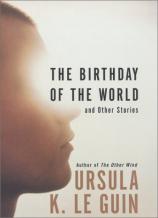The Birthday of the World: And Other Stories
Review
The Birthday of the World: And Other Stories
Science fiction is perhaps the most challenging of all genres to pull off convincingly. Not only does the writer have to craft an engaging plot with plausible characters, often creating an alternate lexicon, but they must fashion a world, often from scratch, that's believable. Ursula K. Le Guin, however, is an expert raconteur whose graceful prose deftly communicates the most complex of imagined worlds. Her stories and novels successfully straddle the great divide that separates literature from popular fiction, setting a standard for sci-fi writers of any age or gender.
Her latest collection of short stories, most of which have been previously published, again showcases her rich writing and sharp wit as she spins entire worlds out of words, constructing complex social structures that play on our traditional ideas of gender and sexuality. Le Guin possesses the keen eye of an anthropologist; skillfully illuminating our own cultural mores through alien civilizations as each of her protagonists struggle to come to terms with themselves and their place in society.
Six of the stories are set in the Ekumen, what she describes as "my pseudo-coherent universe with holes in the elbows" that was first introduced in THE LEFT HAND OF DARKNESS (1969). Although a familiarity with the complexities of her world system certainly help in deciphering the tales, it's not necessary.
"Unchosen Love" and "Mountain Ways" are particular standouts: The former tells the story of a young man who falls for someone far away from home and must decide if the bonds of love are strong enough to sustain a new life in a foreign place. The latter focuses on a society in which marriage is based on a complex, four-way partnership.
The title story --- "The Birthday of the World" --- is the only disappointment. The tale examines the nature of God in a society where hereditary rulers find their power usurped by newly arrived aliens, throwing their age-old culture into chaos. In the forward, Le Guin notes that it may or may not take place in the Ekumen. This ambiguity pervades the story, and her usually lyrical prose comes across as disjointed.
The final, and perhaps best, novella --- "Paradise Lost" --- is a departure from the rest of the collection and provides a remarkable example of Le Guin's ability to craft a provocative and convincing world. Taking place on a spaceship where generations of inhabitants live, love and pass away, the story focuses on the pursuit of happiness and home as they travel toward the planet their ancestors set out to colonize decades earlier.
In her foreword, Ursula K. Le Guin writes, "...to create difference --- to establish strangeness --- then to let the fiery arc of human emotion leap and close the gap: this acrobatics of the imagination fascinates and satisfies me as no other." The brilliance of Le Guin's work lies in her remarkable ability to create worlds completely alien from our own --- and to use these other worlds to comment on our own perceptions of love, sex, marriage, and partnership. This luminous collection is a worthy addition to her already sparkling oeuvre.
Reviewed by Jen Robbins on March 5, 2002
The Birthday of the World: And Other Stories
- Publication Date: March 5, 2002
- Genres: Fiction, Science Fiction
- Hardcover: 384 pages
- Publisher: HarperCollins
- ISBN-10: 0066212537
- ISBN-13: 9780066212531





